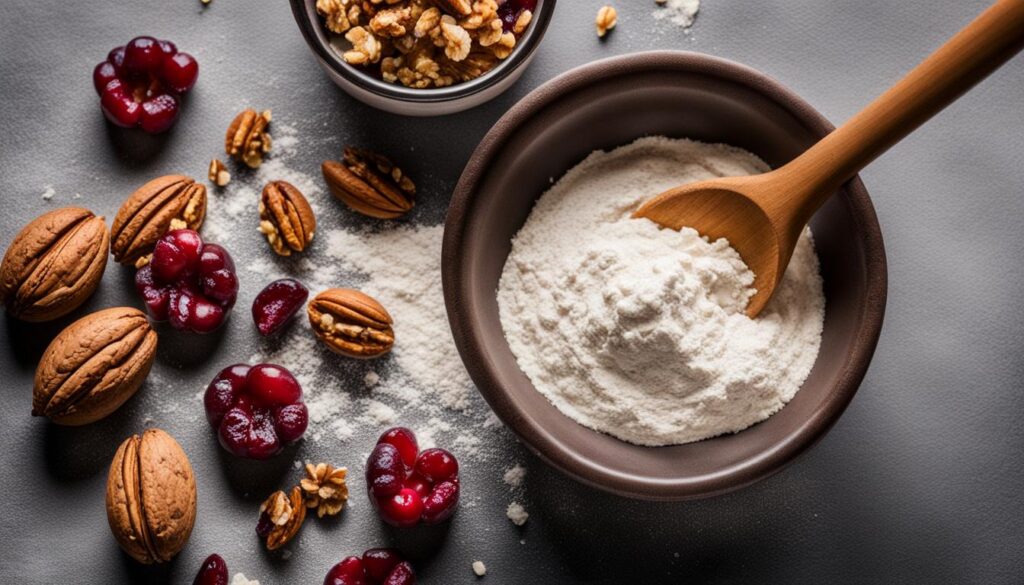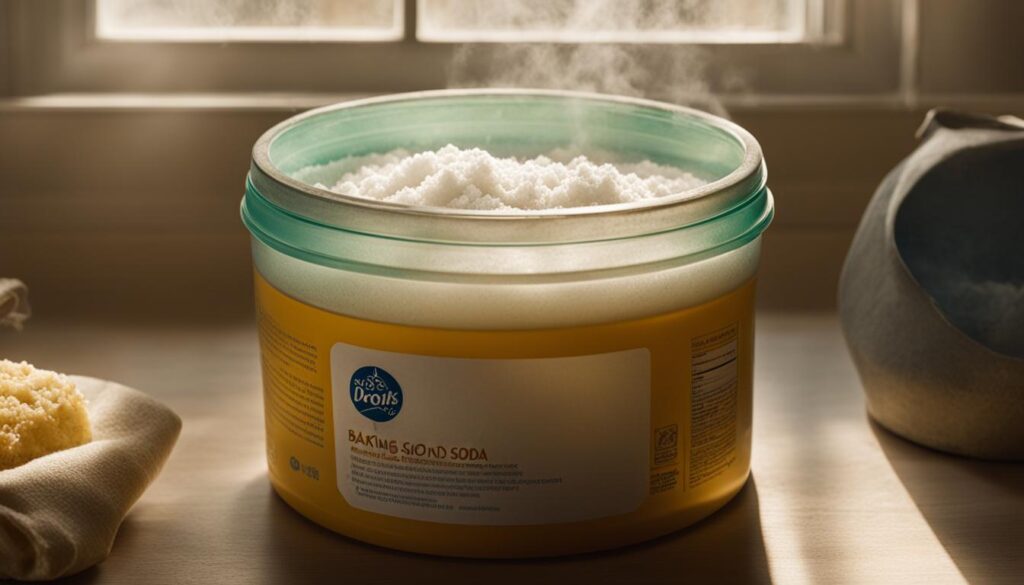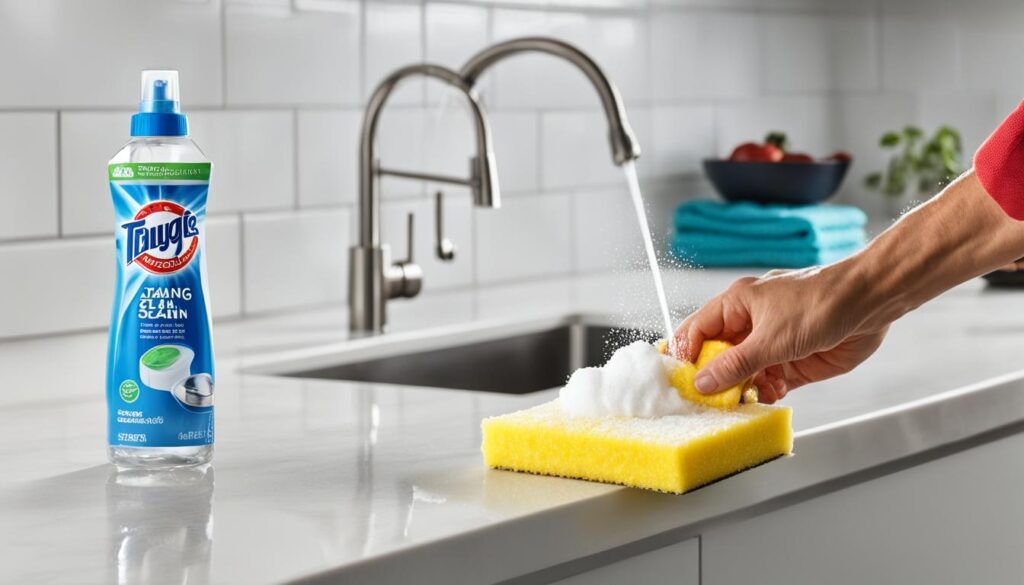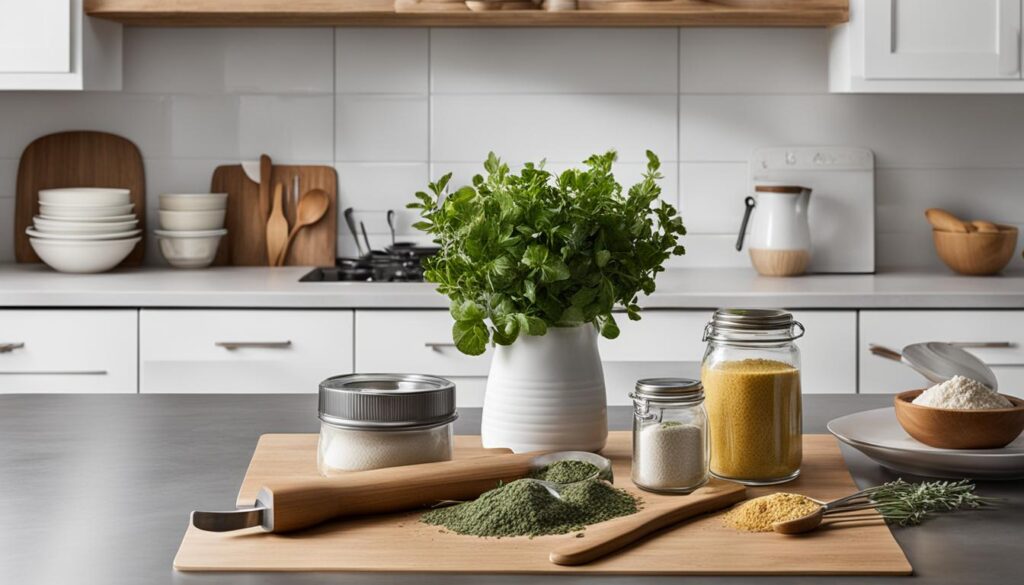Baking soda, also known as sodium bicarbonate or bicarbonate of soda, is a versatile ingredient that offers numerous uses and benefits beyond baking. It is a common household staple with applications in cleaning, cooking, odor removal, teeth whitening, skincare, and overall health. In this article, I will explore the different uses and benefits of baking soda, providing tips for selecting the best quality product and proper storage methods.
Key Takeaways:
- Baking soda, or sodium bicarbonate, is a versatile ingredient with multiple household applications.
- It is commonly used for cleaning, cooking, odor removal, teeth whitening, skincare, and health purposes.
- When selecting baking soda, choose a reputable brand that offers pure and high-quality products labeled as food-grade and aluminum-free.
- Proper storage of baking soda involves keeping it in an airtight container in a cool, dry place away from direct sunlight and strong odors.
- Use baking soda in moderation and follow recommended guidelines to avoid any potential adverse effects.
History and Origin of Baking Soda
Baking soda, also known as sodium bicarbonate, has a rich history dating back centuries. Its origins can be traced back to the late 1700s in France, where it was first produced. Over time, baking soda has gained popularity and become a household staple due to its versatile nature and wide range of uses.
Derived from mineral deposits, baking soda is a naturally occurring compound. Its chemical composition consists of sodium, hydrogen, carbon, and oxygen, resulting in a fine, white, crystalline powder with alkaline properties. This unique composition is what makes baking soda so effective in various applications, including baking, cleaning, and personal care.
Throughout the years, baking soda has proven to be a reliable ingredient in many aspects of daily life. From helping dough rise in baking to effectively cleaning household surfaces, this multi-purpose substance continues to be valued for its properties and versatility.
Discover the fascinating history and practical uses of baking soda in the sections below, as we delve deeper into its culinary, personal care, and household cleaning applications.
Culinary Uses of Baking Soda

Baking soda, with its versatile properties, is a staple ingredient in the world of cooking and baking. Its role as a leavening agent is crucial in creating light and fluffy textures in various recipes. When combined with an acid, such as vinegar or lemon juice, baking soda produces carbon dioxide gas, which helps dough rise. This reaction allows for the formation of air pockets in the batter, resulting in a soft and tender baked good.
One of the most popular uses of baking soda in culinary applications is in bread-making. Adding a small amount of baking soda to bread dough can enhance its rise and improve the overall texture. Cakes, muffins, and cookies also benefit from the inclusion of baking soda by achieving a delicate crumb and a fluffy consistency.
Baking soda goes beyond its leavening capabilities and offers other culinary benefits. It acts as a tenderizer for meats, helping to break down proteins and resulting in more succulent and flavorful dishes. Additionally, baking soda can be used as a pH regulator when cooking certain foods. By balancing the acidity, it can help retain the vibrant colors of vegetables and prevent them from turning mushy.
Furthermore, baking soda serves as a natural cleaner for fruits and vegetables. Its mild abrasive properties allow for the gentle removal of dirt and contaminants from produce, ensuring a thorough and safe cleaning process.
| Culinary Uses of Baking Soda |
|---|
| Bread, cakes, muffins, and cookies |
| Meat tenderizer |
| pH regulator for vegetables |
| Natural cleaner for fruits and vegetables |
Baking soda’s versatility in the culinary world makes it a valuable ingredient in the kitchen. From achieving perfect rise in baked goods to enhancing tenderness in meats and offering natural cleaning solutions, baking soda proves to be an essential tool for any cooking enthusiast.
Personal Care Uses of Baking Soda

Baking soda is a versatile ingredient that extends its benefits beyond the kitchen. It has found numerous applications in personal care, making it a popular choice for many individuals. The mild abrasive properties of baking soda make it an effective ingredient in toothpaste and mouthwash, helping to whiten teeth and freshen breath. By removing stains from teeth and neutralizing odors in the mouth, baking soda promotes oral health and hygiene.
But the benefits of baking soda for personal care don’t stop there. This multipurpose ingredient can also be used in skincare routines. As a gentle exfoliator, baking soda helps remove dead skin cells, revealing a smoother and brighter complexion. Its exfoliating properties make it an ideal choice for those looking to improve the texture and appearance of their skin. Additionally, baking soda can be added to bathwater to soothe skin irritation and neutralize body odors, providing a refreshing and relaxing bathing experience.
“Baking soda’s versatile applications in personal care make it a must-have ingredient for those seeking natural and effective solutions.”
With its various uses and benefits, baking soda has become a go-to ingredient for personal care enthusiasts. Whether it’s for teeth whitening, skincare, or refreshing baths, baking soda offers natural and affordable solutions that can be incorporated into daily self-care routines.
| Personal Care Uses of Baking Soda | Benefits |
|---|---|
| Baking Soda for Teeth Whitening | Whitens teeth and freshens breath |
| Baking Soda for Skincare | Removes dead skin cells, improving complexion |
| Baking Soda for Bathing | Soothes skin irritation and neutralizes body odors |
Baking soda’s versatility and effectiveness in personal care make it a valuable addition to anyone’s self-care routine. Discover the amazing benefits of this natural ingredient and unlock its potential for teeth whitening, skincare, and a refreshing bathing experience.
Household Cleaning Uses of Baking Soda

When it comes to household cleaning, baking soda is a versatile and reliable solution. Thanks to its natural properties, it can effectively clean a wide range of surfaces and eliminate stubborn stains and odors. Whether you need to freshen up your kitchen appliances, sanitize your countertops, or remove grease and grime, baking soda has got you covered.
To maximize the cleaning potential of baking soda, you can combine it with other household ingredients such as lemon juice or vinegar. This powerful combination not only enhances the cleaning properties of baking soda but also acts as a disinfectant, inhibiting the growth of harmful microorganisms.
Here are some common household cleaning uses of baking soda:
Kitchen Appliances
Baking soda can effectively clean various kitchen appliances, including ovens, stovetops, and microwaves. Its gentle abrasive nature helps remove grease and baked-on food, leaving your appliances sparkling clean without any scratches.
Countertops
Whether you have granite, marble, or laminate countertops, baking soda can provide a gentle and effective cleaning solution. It can remove stains, grime, and food residue, leaving your countertops looking fresh and sanitized.
Coffee Cups
Over time, coffee cups can develop unsightly stains and odors. Baking soda can help remove these stubborn stains and eliminate odors, making your coffee cups look and smell brand new.
Sinks and Drains
Baking soda is an excellent natural cleaner for sinks and drains. It can help remove buildup, unclog drains, and eliminate unpleasant odors. Simply pour a mixture of baking soda and vinegar down the drain, let it sit for a few minutes, then rinse with hot water for a fresh and clean sink.
Microwaves
Baking soda can make cleaning your microwave a breeze. By creating a paste with water and baking soda, you can easily remove food splatters and stains from the interior surfaces. Simply apply the paste, let it sit for a few minutes, then wipe clean with a damp cloth.
Carpet Stains
Accidental spills and stains on carpets can be frustrating, but baking soda can help. It can effectively absorb and lift stains from carpets, giving them a renewed appearance. Simply sprinkle baking soda over the stained area, let it sit for a while, then vacuum it up.
Fridge and Garbage Cans
Does your fridge or garbage can have lingering odors? Baking soda can act as a natural deodorizer, eliminating unpleasant smells. Place an open container of baking soda in the fridge or sprinkle some at the bottom of your garbage can to neutralize odors and keep your spaces smelling fresh.
By incorporating baking soda into your cleaning routine, you can achieve a clean and fresh home without relying on harsh chemicals. Make the most of this versatile ingredient and discover the countless household cleaning uses of baking soda.
| Household Surface | How to Use Baking Soda |
|---|---|
| Kitchen Appliances | Create a paste with baking soda and water. Apply the paste to the surface, scrub gently, and rinse thoroughly. |
| Countertops | Sprinkle baking soda on the surface, dampen a cloth or sponge, and scrub gently. Rinse well. |
| Coffee Cups | Create a paste with baking soda and water. Apply the paste to the stains, scrub gently, and rinse well. |
| Sinks and Drains | Pour a mixture of baking soda and vinegar down the drain. Let it sit for a few minutes, then rinse with hot water. |
| Microwaves | Create a paste with baking soda and water. Apply the paste to the interior surfaces, let it sit, then wipe clean with a damp cloth. |
| Carpet Stains | Sprinkle baking soda over the stained area, let it sit, then vacuum it up. |
| Fridge and Garbage Cans | Place an open container of baking soda in the fridge or sprinkle baking soda at the bottom of the garbage can. |
Odor Removal with Baking Soda

Baking soda is a versatile ingredient that is well-known for its ability to neutralize bad odors. Instead of simply masking unpleasant smells, baking soda works by chemically reacting with odor particles and neutralizing them. This makes it an effective and natural option for odor removal in various settings.
One of the ways to use baking soda for odor removal is as an air freshener. By combining baking soda with a few drops of your favorite essential oils, you can create a homemade air freshener that not only masks odors but also eliminates them. Simply mix the baking soda and essential oils together, place them in a jar, and leave it in areas where you want to freshen the air.
Baking soda is also a great solution for neutralizing fridge odors. If your refrigerator has developed an unpleasant smell, a cup of baking soda can be placed in the back of the fridge to absorb and neutralize the odors. This is a natural and safe alternative to chemical-based fridge deodorizers.
With its odor-neutralizing properties, baking soda can help keep your surroundings smelling fresh and clean. Whether you’re dealing with lingering odors in your home, car, or even your gym bag, baking soda can be a go-to solution that is both effective and environmentally friendly.
Cleaning Tips and Cautions for Baking Soda Usage

When using baking soda for cleaning purposes, it is important to follow some tips and cautions to ensure optimal results and avoid any potential issues.
Testing on a Small Area
Before applying a baking soda solution to a larger surface, it is advisable to perform a patch test on a small, inconspicuous area. This step helps to determine whether the baking soda solution may cause any damage or discoloration to the material.
Avoid Mixing with Acidic Substances
When using baking soda as a cleaner, it is essential to avoid mixing it with acidic substances. Acids can react with baking soda and neutralize its cleaning properties, rendering it less effective. Therefore, it is recommended to use baking soda separately or in combination with alkaline solutions, such as water or mild detergents.
Rinsing Thoroughly
After cleaning with baking soda, it is crucial to rinse the surface thoroughly to remove any residue left behind. This step ensures that no baking soda particles are left behind, preventing potential abrasion or accumulation of residue over time.
Using Baking Soda Safely
While baking soda is generally safe to use, it is essential to exercise caution and follow the recommended guidelines. Avoid ingesting baking soda in large quantities, as excessive consumption can lead to stomach upset or electrolyte imbalances. Additionally, keep baking soda out of reach of children and pets to prevent accidental ingestion.
By following these cleaning tips and cautions, you can make the most of baking soda’s cleaning capabilities while ensuring a safe and effective cleaning experience.
Health Benefits and Applications of Baking Soda

Baking soda, also known as sodium bicarbonate, offers numerous health benefits and has a range of applications. Here are some of the ways baking soda can benefit your health:
- Natural remedy for heartburn and acid reflux: Baking soda can help alleviate the discomfort caused by heartburn and acid reflux by neutralizing stomach acid. It works by acting as an antacid and can provide temporary relief. However, it is important to use baking soda in moderation and under the guidance of a healthcare professional, as excessive consumption can disrupt the body’s natural acid-base balance.
- Baking soda mouthwash for fresher breath: Baking soda can be used as a mouthwash to freshen breath and inhibit bacterial growth in the mouth. A simple solution of baking soda and water can help neutralize odor-causing compounds and promote oral hygiene. However, it is essential to consult with a dentist or healthcare professional before incorporating baking soda mouthwash into your oral care routine.
- Soothing skin conditions: Baking soda can provide relief for certain skin conditions such as insect bites and sunburns. By creating a soothing paste with baking soda and water, you can help reduce itching, redness, and inflammation. However, it is crucial to conduct a patch test before applying baking soda to larger areas of the skin and to discontinue use if any adverse reactions occur.
While baking soda can offer health benefits, it is important to use it judiciously and with caution. If you have specific health concerns or if you are taking medications, it is always recommended to consult with a healthcare professional before using baking soda as a remedy or incorporating it into your personal care routine.
| Health Benefits | Applications |
|---|---|
| Neutralizes stomach acid | Remedy for heartburn and acid reflux |
| Freshens breath | Mouthwash |
| Alleviates skin conditions | Insect bites and sunburn relief |
Selecting the Best Quality Baking Soda

When it comes to baking soda, choosing the best quality product is essential for optimal results. Here are some tips to help you select the highest quality baking soda for all your culinary and cleaning needs.
- Look for a reputable brand: Opt for baking soda from a trusted brand that is known for producing high-quality products. A reliable brand ensures that you are getting a pure and consistent product.
- Check for food-grade labeling: Verify that the baking soda you choose is labeled as food-grade. This ensures that it meets the necessary safety and quality standards for culinary use.
- Avoid additives and fillers: Be cautious of baking soda products that contain additives or fillers. These can negatively impact the performance and safety of the baking soda. Opt for pure baking soda without any unnecessary additives.
- Choose aluminum-free baking soda: Aluminum-free baking soda is the preferred choice, especially for individuals concerned about potential health issues related to aluminum exposure. Look for baking soda specifically labeled as aluminum-free.
- Check the expiration date: Baking soda has a long shelf life, but it’s still important to check the expiration date before purchasing. Using expired baking soda may affect its effectiveness in recipes.
Proper Storage of Baking Soda
To ensure the freshness and effectiveness of your baking soda, proper storage is key. Follow these guidelines for optimal results:
- Keep it airtight: Store baking soda in an airtight container to prevent moisture from affecting its quality. An airtight container helps preserve its freshness and ensures it remains ready to use.
- Away from strong odors: Baking soda has the ability to absorb odors, so avoid storing it alongside strongly scented substances. This will help maintain its original flavor and prevent any unwanted odors from transferring to your baked goods or cleaning solutions.
- Avoid sunlight and heat: Store your baking soda in a cool, dry place away from direct sunlight and heat sources. Excessive heat and humidity can impact its performance and may cause clumping or degradation of the product.
By selecting the best quality baking soda and storing it properly, you can ensure that it remains fresh, effective, and ready to use for all your baking, cleaning, and odor-neutralizing needs.
| Benefits of Selecting the Best Quality Baking Soda |
|---|
| Pure and consistent product |
| Meets safety and quality standards |
| Enhanced performance and effectiveness |
| Avoidance of potential health concerns |
| Longer shelf life |
| Preserved freshness and flavor |
| Prevention of odor transfer |
| Optimal results in baking and cleaning |
With the right baking soda and proper storage, you can confidently incorporate this versatile ingredient into your daily routines, knowing that you’re using the best quality product available.
Proper Storage of Baking Soda
To ensure the longevity and effectiveness of baking soda, it is crucial to store it properly. Here are some essential guidelines for proper storage:
- Use an airtight container: Baking soda should be kept in an airtight container to prevent moisture and contaminants from entering. This will help maintain its freshness and quality over time.
- Avoid strong-smelling substances: Be cautious of storing baking soda near strong-smelling substances, as it has the potential to absorb odors. Keeping it away from pungent items will help preserve its natural odor-neutralizing abilities.
- Select a cool, dry location: It is important to store baking soda in a cool and dry place to maintain its effectiveness. Excessive heat and humidity can impact its performance, so avoid direct sunlight or areas prone to moisture.
Expert Tip:
For added protection, consider storing baking soda in the refrigerator or freezer. This will not only maintain its freshness but also enhance its ability to absorb unwanted odors.
By following these proper storage practices, you can extend the shelf life of your baking soda and ensure its optimal performance whenever you need it.
Conclusion
In conclusion, baking soda, or sodium bicarbonate, is a versatile ingredient that offers numerous benefits for various aspects of our daily lives. From cooking and baking to personal care and household cleaning, baking soda has proven to be a natural and effective solution. However, it is important to use baking soda in moderation and follow the recommended guidelines to avoid any potential adverse effects.
When selecting baking soda, it is crucial to choose a reputable brand that offers pure and high-quality products. Look for baking soda labeled as food-grade and aluminum-free to ensure its safety and performance. Proper storage of baking soda is also essential, as it should be kept in an airtight container in a cool, dry place away from direct sunlight, heat, and strong odors.
By understanding the various applications and benefits of baking soda, you can utilize this household staple to enhance your cooking, improve personal care routines, and maintain a clean and fresh home. So, embrace the power of baking soda and unlock its natural benefits in your everyday life.
FAQ
What is baking soda?
Baking soda, also known as sodium bicarbonate, is a versatile compound with alkaline properties that is commonly used in baking, cleaning, and personal care.
What are the culinary uses of baking soda?
Baking soda can be used as a leavening agent in baking, a tenderizer for meats, a pH regulator in food preparation, and a natural cleaner for fruits and vegetables.
How can baking soda be used for personal care?
Baking soda can be used for teeth whitening, as a mouthwash, as a gentle skin exfoliator, and as a soothing remedy for skin irritation.
What are the household cleaning uses of baking soda?
Baking soda can be used to clean kitchen appliances, countertops, coffee cups, sinks, drains, and microwaves. It can also remove stains from carpets, deodorize the fridge and garbage cans, and eliminate odors in the air.
How does baking soda remove odors?
Baking soda can be used as an air freshener by neutralizing odor particles, and it can also be used as a natural deodorizer for the fridge by absorbing and neutralizing unpleasant odors.
What are some cleaning tips and cautions for using baking soda?
Always test baking soda solutions on a small area before applying them to larger surfaces, avoid mixing baking soda with acidic substances, and rinse surfaces thoroughly after cleaning.
What are the health benefits and applications of baking soda?
Baking soda can be used as a natural remedy for heartburn, freshen breath, soothe insect bites and sunburns, but it should be used in moderation and under the guidance of a healthcare professional.
How should I select the best quality baking soda?
Choose a reputable brand that offers pure and high-quality baking soda labeled as food-grade and aluminum-free, and avoid products with additives or fillers.
How should baking soda be stored?
Baking soda should be stored in an airtight container in a cool, dry place away from direct sunlight and strong-smelling substances.
What are the uses and benefits of baking soda?
Baking soda has a wide range of uses, including cooking, cleaning, personal care, odor removal, and health-related applications.






